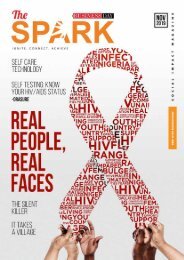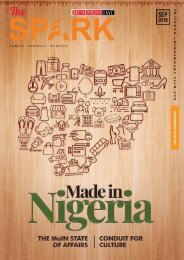Create successful ePaper yourself
Turn your PDF publications into a flip-book with our unique Google optimized e-Paper software.
The Spark | Ignite / Connect / Achieve<br />
www.thesparkng.com<br />
GETTING CREDIT<br />
Easing<br />
the Hustle<br />
With the number of Nigeria’s unemployed put at a staggering<br />
20.9 million, the solution to this mammoth problem clearly lies<br />
with the MSMEs in the nation. Improved access to credit for<br />
MSMEs is a welcome development so they can scale, create<br />
more jobs and stimulate economic growth.<br />
By Yvonne Johnson<br />
The estimated 37 million Micro,<br />
Small and Medium-sized Enterprises<br />
(MSMEs) in Nigeria hold a<br />
lot of promise for job creation and economic<br />
growth. An enabling business<br />
environment is important for these<br />
businesses to thrive in the large, young<br />
consumer market that is Nigeria. Access<br />
to formal credit is a prerequisite<br />
to scale and recent laws will improve liquidity<br />
of movable assets to incentivize<br />
lending.<br />
The Presidential Enabling <strong>Business</strong> Environment<br />
Council (PEBEC) was established<br />
in 2016 to design ease of doing<br />
business policy reforms. A 2017 IFC<br />
survey found that secured credit transactions<br />
involving movable assets (such<br />
as inventory, receivables, livestock, and<br />
machinery) can increase credit levels<br />
for small businesses. Consequently, PE-<br />
BEC, in collaboration with the National<br />
Assembly and MDAs, delivered reforms<br />
through two new laws - The Credit Bureau<br />
Act, 2017 and the Secured Transactions<br />
in Movable Assets Act, 2017.<br />
These were a significant milestone for<br />
MSMEs, as they unlocked capital by expanding<br />
the pool of eligible collateral<br />
for lending.<br />
PEBEC’s work sets the stage for lenders<br />
to adopt better risk innovation to<br />
close a widening SME credit gap. This<br />
involves predictive analytics models<br />
to supplement credit bureau data. For<br />
risk managers, the implications for<br />
much needed risk innovation is an exciting<br />
aspect of ongoing digitization<br />
programs within Financial Services. Beyond<br />
improvements in customer experience,<br />
lenders can also expect to drive<br />
both revenue and cost value across the<br />
credit value chain.<br />
Easing the Hustle<br />
Nigeria’s economy is slowly recovering<br />
from recent shocks, but growth is well<br />
below what is required to overcome<br />
vulnerabilities and improve citizens’<br />
welfare. PEBEC’s focused mandate is<br />
to improve our position in the annual<br />
World Bank Doing <strong>Business</strong> Rankings.<br />
The expectation is for a much favorable<br />
landscape for enterprise, particularly<br />
SMEs, to thrive and ultimately scale<br />
operations. This in turn incentivizes<br />
greater investment, both domestic and<br />
international.<br />
PEBEC prioritized 7 reform areas along<br />
the World Bank rankings framework<br />
including access to credit. Completed<br />
reforms have focused on a better<br />
credit infrastructure including stronger<br />
“Forecasts show African<br />
banks will continue to<br />
struggle with a high cost<br />
structure, lower financial inclusion<br />
and low wealth per<br />
capita. However, consumer<br />
credit presents a growth<br />
opportunity with far-reaching<br />
social impact.”<br />
08 @the<br />
sp<br />
ark<br />
ng

















